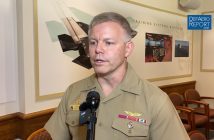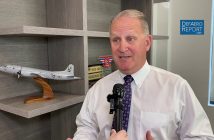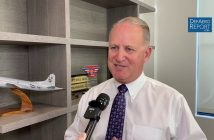Rep. Adam Smith, D-Wash., the current ranking member of the House Armed Services Committee who will become chairman in January, discusses defense spending outlook, nuclear modernization, Afghanistan strategy and more with Defense & Aerospace Editor Vago Muradian during the Reagan National Defense Forum at the Ronald Reagan Presidential Library in Simi Valley, Calif. Our coverage was sponsored by L3 Technologies and Leonardo DRS
Representative Adam Smith
Next Chairman of the House Armed Services Committee
Reagan National Defense Forum
November 2018
Vago Muradian: Welcome to the Defense and Aerospace Report. I’m Vago Muradian here at the Reagan National Defense Forum, America’s leading gathering of leaders from military, politics, industry, economics, and the thought leadership world. We’re here at the Ronald Reagan Presidential Library in Simi Valley, California, and our coverage here is sponsored by Leonardo DRS and L3 Technologies.
We’re honored to have with us the man who’s going to be the next Chairman of the House Armed Services Committee, Representative Adam Smith, Democrat from the great state of Washington. Sir, congratulations, and thanks very much for the time.
Representative Adam Smith: Thank you. I appreciate that.
Mr. Muradian: So let’s get right into the budgetary situation. You’ve made your priorities clear where you’re going to put appropriate oversight. You know, in some respects it was great to hear you and Chairman Thornberry talk about bipartisanship and how actually some of the priorities don’t change, and that the whole point is to get better security for the nation. There’s a big debate, though, on the amount of spending.
The President has reduced spending from $733 to $700. Jim Inhofe, the Senate Armed Services Committee Chairman is saying that $733 should be a floor. You’ve said that $700 should likely be a ceiling. We’ve got Jim Mattis and Inhofe and Mac Thornberry are going to go and visit the President next week, on Tuesday, is my understanding, to talk to him and Mick Mulvaney and to make the case along with Jim Mattis for more resources.
Talk to us about how this is going to play out. I mean is this going to be something where at the end of the day we’re just going to split the middle and just end up at $716?
Mr. Smith: First of all, the main goal is to get an agreement on all the discretionary spending bills. There’s 12 different discretionary spending bills. We have two more years on the Budget Control Act which sets a very tight ceiling on spending in all of those areas. We would like to get an agreement that gets rid of the Budget Control Act for those last two years.
Second, it’s going to be a leadership decision. It’s going to be the White House. It’s going to be the leadership in the House, the leadership in the Senate in both parties who are going to have to decide what that number is. People like Senator Inhofe and I and Mac Thornberry, we’ll have input, but this is a leadership decision about what that number is. And it’s balancing a whole bunch of different issues.
Our job on the committee, our job is to whatever number they give us we mark to it. So what those of us on the authorizing side think about what the numbers should be, we don’t really control that.
Mr. Muradian: Let me ask you then about some of the priorities within the measure. Everybody is talking about — well, on the one hand you have the National Defense Strategy Commission that’s arguing for almost a trillion dollars in spending. A dramatic increase and have that sustained over a long period of time to realize the National Defense Strategy.
You’ve always believed in strong defense spending, but you’re also a fiscal hawk in a lot of ways where you want the deficit reduced.
Mr. Smith: — what the balance is. I don’t agree with the people who say that defense is so important that we spend what we have to and we don’t pay any attention to it. I also don’t agree that we’re necessarily safer because we spend more money. It depends on what we’re spending it on. And I think there are a ton of efficiencies that can be found in the Pentagon and we have to balance that against a $22 trillion federal debt, against domestic priorities such as infrastructure. All of that has to be balanced.
The one thing I feel very strongly about, we can protect this nation for a budget that’s less than $700 billion. I strongly disagree with folks who say different. We certainly have looked at — we just got the reports on the audit. Clearly, the Pentagon has issues to work on in terms of how they spend their money. And that’s the biggest thing that I feel, is the notion that somehow we will not be safe if we don’t spend $750 billion is wrong. It’s not how much we spend, it’s how we spend it, and that’s what I’m really going to be focused on.
Mr. Muradian: Talk to us a little bit about where you can find efficiencies. This is a holy grail and everybody’s talking about it, but sometimes they don’t find as much as they want to. Where do you think is where we can take risk in terms of capability? Because as Kori Schake, who we talked to from IISS said, you know, innovation is also figuring out what you’re not going to do. So talk to us on both of those poles on how you’re going to be driving the agenda forward as the Chairman.
Mr. Smith: First of all, there are a ton of efficiencies that are being found. I will praise the Pentagon and Secretary Mattis. They’re going through program by program and finding savings. I just met with the Secretary of the Army, Mark Esper. He’s found billions of dollars in going through the programs in areas where they don’t really need to spend money. So there are savings to be found within the budget.
The other thing is, when you’re prioritizing, I don’t think we need 5,000 nuclear weapons. Yes, we need to recapitalize our nuclear program. It’s old, it’s aging, it needs to be shored up. But there’s plenty of money that we can save and still meet our national security needs. Instead of planning for how we can win a nuclear war, we need to adopt a deterrence strategy.
One of our major countries that we’re concerned about in the world is China. China has 250 nuclear missiles. That’s it. Or nuclear warheads, I should say. They think that is a sufficient deterrent to meet their needs. We are way overspending, in my view, on nuclear weapons.
And in terms of managing risk, I think that’s a risk we can manage quite easily and still meet our national security needs. So I think there’s plenty of areas to go.
Mr. Muradian: Two quick questions. First, on cyber. Everybody’s been highlighting the threat to this but the situation is actually a lot more grave than I think most Americans recognize in terms of when you look at the totality of the penetrations, whether they’re resident threats, where they’re the stealing of electronic warfare files, or anything else. Talk to us a little bit about how you’re going to approach that part of the portfolio. I know the Speaker has a big AI initiative, the Solarium Group. We talked to Mike Gallagher a little bit.
Talk to us about how you’re going to approach the whole cyber challenge.
Mr. Smith: I think this is an area where we can transition. I think we’re spending a lot of money on legacy programs that were important in the past, but what’s the future? The future is cyber. How can we start spending money on the things that are going to be crucial? Everything we’ve got is dependent upon our networks working. You shut down those networks, you stop an aircraft carrier dead in its tracks in the middle of the sea. So we are really going to emphasize how we can better protect our cyber. And I think there’s savings to be found there.
If cyber is the warfare of the future, we can get good at that for a lot cheaper than building a whole bunch of very expensive weapon systems. So I think there are savings to be found.
Mr. Muradian: And do you think that there is going to be a sequester extension? There are some folks who are saying that if there’s a big budget deal sequester will get extended for another few years? Or do you think it’s just two years and it’s over?
Mr. Smith: I don’t know. I would oppose that, but we’ve got a lot of votes that we’ve got to pull together to make this happen. So I don’t think that’s a good idea, but that doesn’t mean that it won’t happen.
Mr. Muradian: And on Afghanistan? That’s going to be a hot issue as well.
Mr. Smith: It’s getting to the point where we’re basically, we’re going to have to prove that there’s a value in us staying there and that there is a light at the end of that tunnel. I’m becoming concerned that we hear the same thing over and over again. That we’re just this close to getting a peace deal and if we just stick around for one more year, it’s all going to work out.
It may be getting close to time to say look, we just cannot fix this problem militarily. But we’re going to try to work and get to a peace negotiation that’s going on right now.
Thank you very much.
30




